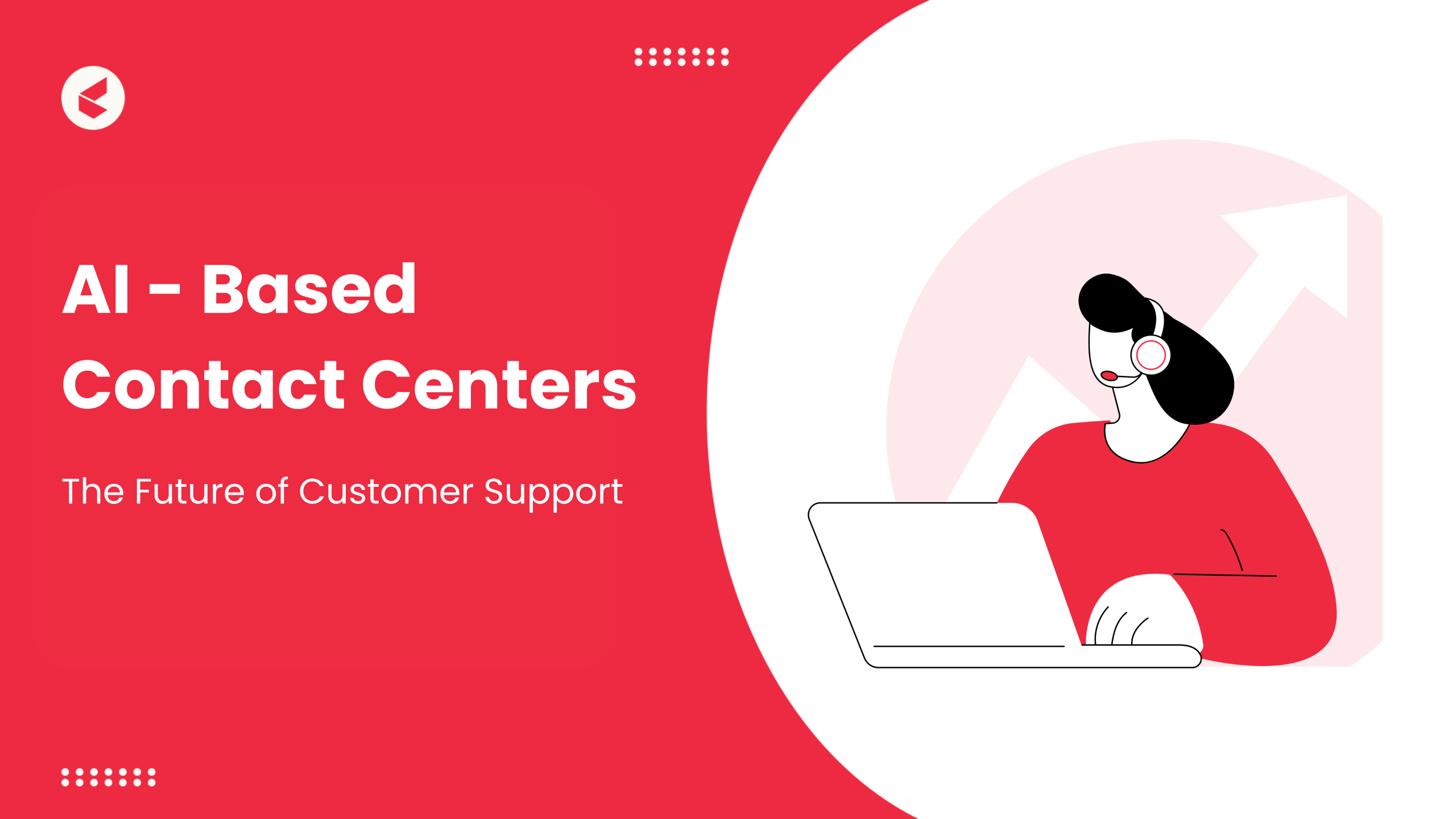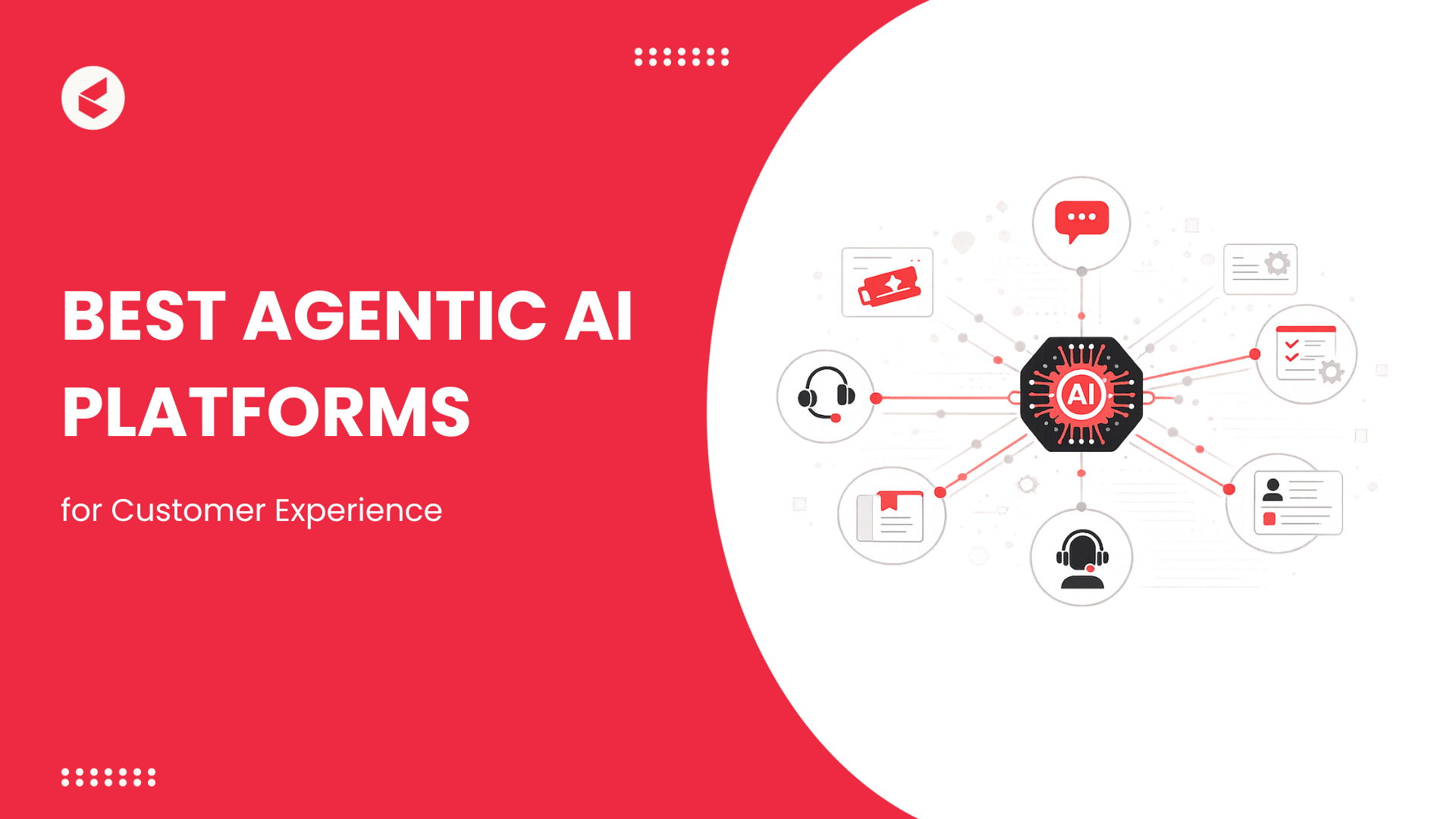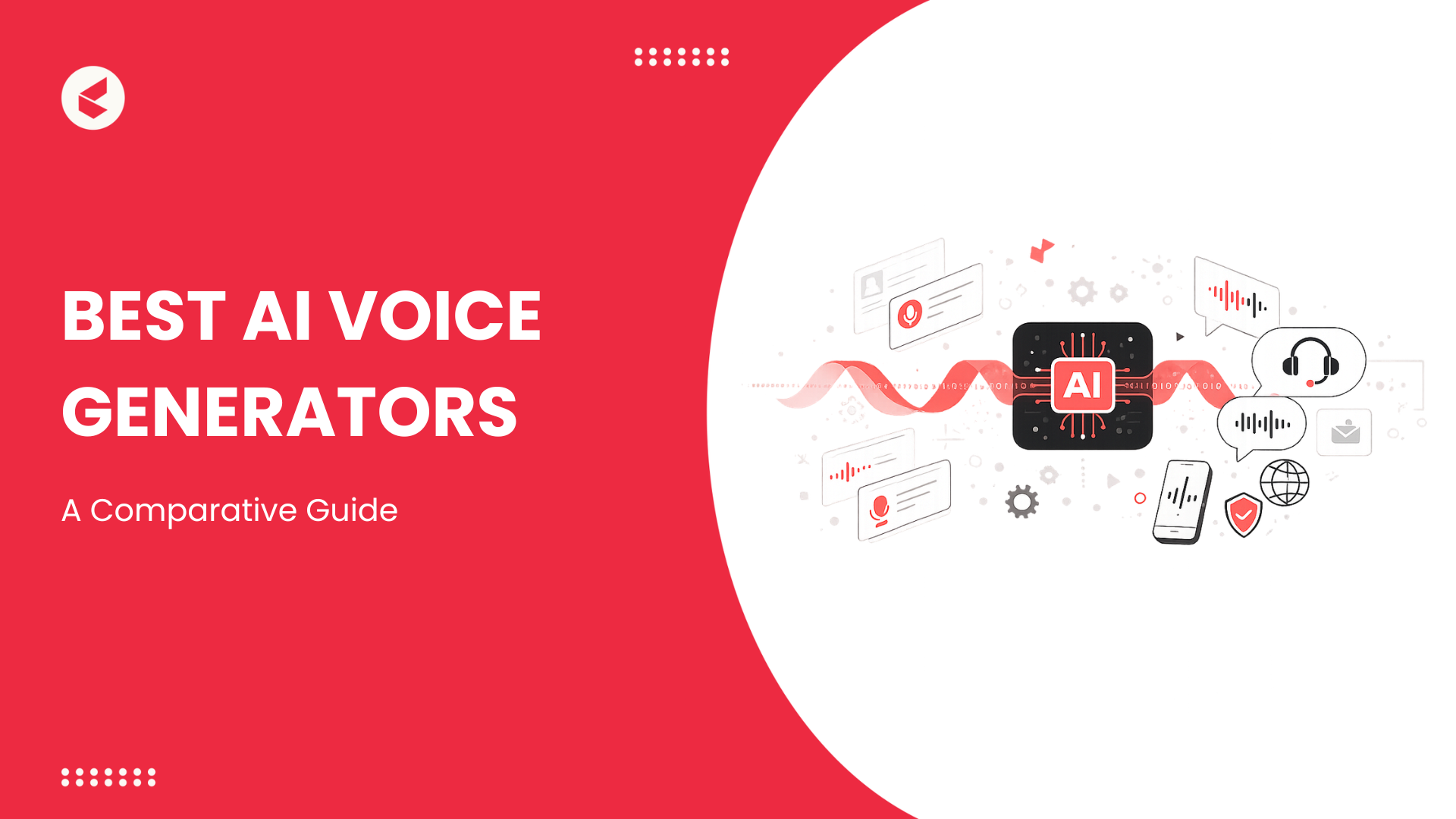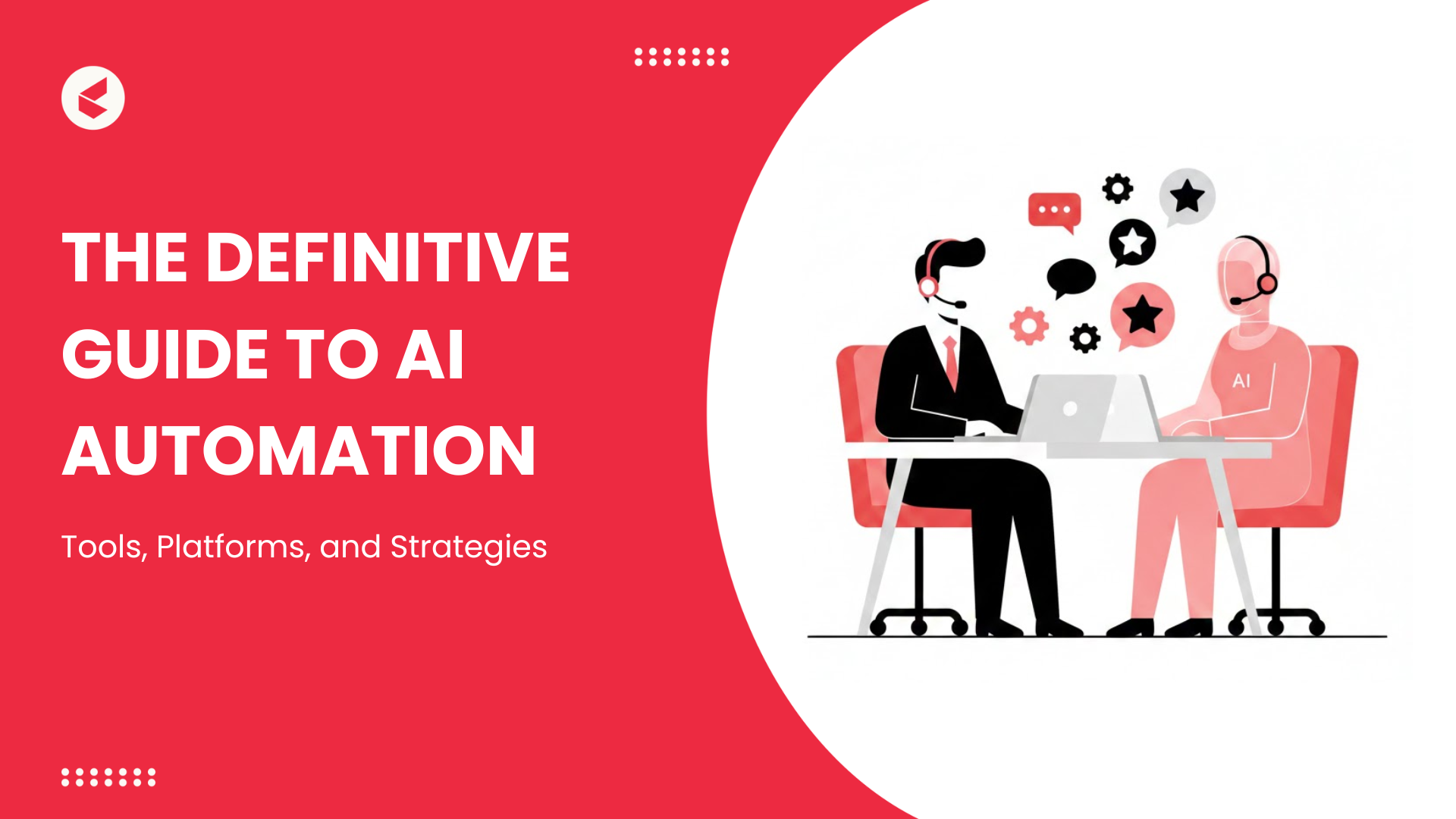Traditional contact centers often struggle with outdated technology, high call volumes, increased abandonment rates, and a lack of real-time data visualization. This leads to poor service quality.
There is also an increasing reliance on support due to the rise in online shopping and digital interactions. Customers contact support systems for even the most basic questions and anticipate prompt resolution. According to Forbes, 83% of customers anticipate interacting with a help desk as soon as they try to contact.
This is where automation and AI technologies bridge the operational gaps in contact centers. Companies can now utilize AI to automate customer support conversations to save time for customers, along with getting them a much better and improved experience.
Read on to learn more about contact center AI, benefits, use cases, challenges, best practices, and more.
What is Contact Center AI?
Contact Center AI refers to the integration of artificial intelligence technologies into customer service environments.
Artificial intelligence in contact centers aids quicker responses and amps up customer satisfaction by:
- Automating routine queries
- Providing real-time agent assistance and recommendations
- Personalizing interactions based on customer history and behavior
- Optimizing workforce management and operational efficiency
- Analyzing customer communications for insights and continuous improvement
Let’s now review how AI improves contact center customer interactions:
- Effective Query Resolution: AI analyzes consumer inquiries and provides accurate responses in a few seconds.
- Personalized Experience: AI uses client data to customize interactions based on past preferences and behaviors.
- High-Volume Ticket Management: AI is capable of handling a high volume of repetitive queries, allowing operations to scale easily during busy periods without compromising service quality.
Key AI Technologies Powering Contact Centers
Contact center AI offers a seamless integration of technology and customer service.
Here are the top AI technologies that help contact centers level up their CX.
1. Natural Language Processing (NLP)
NLP uses AI and machine learning to help computers understand and interpret human language. This assists virtual assistants and chatbots in reacting to customer inquiries in a more natural way.
NLP can analyze customer feedback to identify trends and enhance service quality.
2. Predictive Analytics
Predictive analytics examines historical data to anticipate the requirements and behaviors of customers. It equips contact centers to follow a proactive approach for forecasting problems even before they arise.
3. Automated Call Distribution (ACD)
This technology routes incoming calls to suitable agents intelligently based on predefined criteria such as
- Skill set
- Availability
Contact centers use ACD to optimize call handling. When a customer calls for a billing concern, the ACD system recognizes the account number and transfers it to a billing inquiry agent. This reduces waiting times and provides customers with expert support.
4. Speech Recognition
AI-driven speech recognition converts voice into text, allowing hands-free navigation through IVR menus and self-service options.
Sophisticated speech recognition systems enhance accessibility and streamline the customer journey by accurately interpreting spoken requests.
5. Sentiment Analysis
This technology evaluates customer interactions to categorize sentiments as positive or negative. Contact centers can enhance service quality and customize their solutions by identifying customer emotions.
Also Read – Contact Center Analytics in 2026: A Strategic Guide to High-ROI Insights
For example, sentiment analysis detects frustration in a customer’s message about a delayed delivery, allowing support teams to prioritize their query for human assistance.
Benefits of AI in Contact Centers
From operational efficiency to improved CX, here are some of the top benefits of AI in contact center.
1. Improves Agent Efficiency
It is no longer necessary for contact center representatives to follow restrictive scripts that disregard each customer’s unique requirements.
Providing dashboards driven by generative AI to contact center staff can increase agent productivity and reduce inaccurate or faulty responses. Representatives can then converse with customers with greater assurance because they have access to real-time information.
2. Improves Omnichannel Customer Experience
AI improves omnichannel CX in contact centers by ensuring smooth and consistent interactions across multiple communication channels.
When a customer reaches out to a contact center, AI tracks their previous interactions. This helps agents quickly access important information and ensures customers don’t have to repeat themselves when switching channels.
3. 24/7 Availability
As per BusinessDasher, 36% of business professionals think that AI tools make customer service available 24/7.
AI-enabled chatbots and voicebots reduce wait times and assist customers beyond business hours. This flexibility caters to a diverse range of customer preferences.
4. Offers Data-Driven Insights
Contact center AI analyzes past interactions to deliver actionable insights. It offers data to curate personalized, targeted customer interactions that are quick.
5. Helps in Cost Reduction
AI in contact centers reduces agent workload and cuts labor costs. Additionally, it optimizes resource allocation and minimizes operational expenses by analyzing call volumes and patterns.
6. Generate Ticket Summaries
Customer data helps track and optimize customer service interactions to deliver a positive CX.
Contact center AI is capable of producing a suggested summary from even the most intricate chat and email exchanges. AI-generated summaries are auto-stored in the case log, allowing agents to review, finalize, and ensure accuracy quickly. Additionally, if a ticket reopens, agents can refer to the summary for faster resolution instead of reviewing the entire case.
Use Cases of AI in Contact Centers
While 24/7 customer support and personalized services are the key benefits of AI in contact centers, let’s take a look at some effective use cases.
1. Chatbots and Voice Bots
AI uses machine learning and natural language processing to equip chatbots and voicebots in contact centers with the requisite data. These technologies further enable real-time comprehension, interpretation, and response by bots to customer requests.
2. Automated Quality Assurance
Quality assurance in contact centers is a labor-intensive process where agents’ performance is manually evaluated and listening to taped calls. AI can make this easier and review bulk dialogue in real-time to check for customer satisfaction and compliance with business needs.
3. Dynamic Knowledge Base Updates
Generative AI can build a dynamic knowledge base that continuously learns and modifies in response to real-world customer interactions. This implies that the knowledge base is automatically updated as new issues emerge.
AI can analyze incoming queries and automatically update the internal knowledge base with
- FAQs
- Response templates
- Industry-relevant data
4. Real-time Call Transcription and Insight Generation
Real-time call transcription with insight generation is another use of AI in contact centers. This technology records conversations in real time and analyzes them to extract useful information.
AI can analyze call transcripts to identify common questions and generate FAQs or tutorial videos. This helps in reducing future call volumes.
Challenges Contact Centers Face When Adopting AI
Along with a wide suite of benefits, integrating AI in a contact center comes with its own set of challenges. Here is a quick snapshot of the most common challenges.
1. Data Quality
AI systems rely heavily on quality data to function effectively. Hence, outdated or incorrect data fed into these systems can lead to poor CX. In fact, Dynatrace states that 92.7% of executives have stated data as one of the major barriers to the successful implementation of AI.
Therefore, organizations must prioritize data cleansing and validation before deploying AI solutions.
2. Employee Buy-In
The implementation of AI can make employees anxious about their job security.
Contact centers must communicate to employees that AI’s use case is more of a supplementary tool that augments human capabilities rather than replacing them.
Offering sufficient training and showcasing the advantages of artificial intelligence can further alleviate these worries.
3. Integration with Existing Systems
Many contact centers use a diverse range of software tools for customer interaction management. With AI, these different systems function as a single unit.
Integrating AI with legacy systems can be challenging. Hence, contact centers must opt for specialized development and extensive testing.
How to Implement AI in Your Contact Center
Implementing AI involves careful planning and strategy. Here’s a step-by-step guide to ensure a smooth transition.
1. Gauge Your Existing Systems
Take a thorough audit of your existing systems and technology prior to employing AI. Map where AI can be of use. For instance, automating repetitive work or adding depth to data analysis.
Auditing your existing infrastructure will allow you to identify gaps. This provides the facility for more strategic rollout that leverages your existing workings.
2. Decide on the Right AI Tools
Select AI tools that meet your unique business needs and that can easily integrate with your existing helpdesk or CRM solution. Choose solutions that can scale up to the size of your company.
3. Train Your Team
Efficient staff training is essential for a successful AI deployment. Give your agents the resources they need to collaborate with AI tools efficiently.
Training ought to address how to decipher AI-generated insights and interact with clients in a way that makes use of AI’s potential. A culture of collaboration between AI and human agents can improve customer service quality and employee satisfaction.
4. Monitor and Iterate
After implementing the AI solution, monitor the performance to gauge its effectiveness. Collect input from agents and customers to determine what needs to be improved.
To assess success, use indicators such as
- Issue and query resolution rates
- Response times
- Customer satisfaction scores
Given how quickly AI technology is developing—from tools that manage customer data to those that generate fonts with AI—keep your options open and adaptable. Also, regular updates and refinements can help you stay ahead of customer expectations and industry trends.
5. Prioritize Data Privacy and Compliance
Data security and privacy must be given top priority while implementing AI. Make sure that the AI tools you select abide by applicable laws, such as the CCPA or GDPR.
Put in place strong access controls and encryption to safeguard private customer data. Additionally, train your employees on data privacy best practices to preserve the confidence of your customers and shield your company from possible legal risks.
Drive CSAT with AI in Contact Center
Implementing AI in your contact center is just the beginning; the next step is to use this technology to drive Customer Satisfaction (CSAT).
By utilizing AI tools in contact centers, you can make the most out of every service encounter. Your customers receive a quick resolution to their issues along with a personalized experience, and your agents accomplish more work with less hassle.
Partner with Kapture CX for hyper-personalized customer experiences powered by AI. From sentiment analysis to load prediction, we help contact centers seamlessly integrate AI solutions into their existing systems.
Here is what we provide to ensure high-end customer service across all channels:
- Conversational AI chatbots: Craft personalized interactions and smart solutions with 24/7 availability.
- Voicebots: Multilingual voicebots offering human-like, LLM-driven responses.
- Gen AI Knowledge Base: Automate knowledge creation and deliver accurate answers with AI and NLP.
- Smart Routing: Ticket distribution based on skills, language, availability, priority and more.
- Agent Assist: Empower agents with tools like Fix Response, Tone Suggestion, Magic Reply, and Elaborate Text for impactful responses.
- Omnichannel Support: Implement Self-Serve Bots to provide customer support across all channels, including websites, apps, social media, email, etc.
- AI-driven Analytics: Examine a wide range of KPIs and sub-KPIs to identify areas where your service needs to be improved.
- AI-powered summaries: Generate comprehensive summaries upon ticket closure to identify customer details and solutions.
AI-driven contact centers are the future of customer support. With AI solutions, businesses can reduce costs and improve customer satisfaction.
Ready to take the next step? Explore how Kapture CX can assist you.
FAQs
Contact Center AI automates routine tasks and provides real-time responses to resolve customer queries and transform the way support teams operate.
AI enhances customer support by providing quick and accurate responses to queries, 24/7 availability, personalized interactions based on customer history, and generating ticket summaries for future reference.
It depends on the context! Many customers appreciate the speed and convenience of AI for simple inquiries or routine tasks. However, when it comes to complex issues or more sensitive topics, human agents are still preferred. A hybrid approach yields the best results.
AI can sometimes put data privacy at risk in contact centers. However, you can overcome this with thorough sanity checks and following security protocols.















